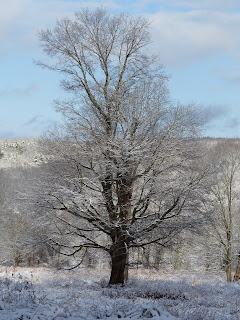Sunday afternoon. Close enough to shake a stick at to fifty years ago, in my lonely and melancholy youth, Joni Mitchell's
Blue was the one record I could never listen to enough. Shut in behind dormroom doors, I played it over and over on a clunky portable hi-fi that was already a museum piece by the time I got hold of it. There was nothing unique in this;
Blue was a very popular record, at least among the people I hung out with. Mitchell sang beautifully, in spite of whatever minor technical imperfections she might have had at that point in her development, she
was beautiful to look at, but most important, nothing she did before or after, not even gems like
Hejira (maybe her "masterpiece," overall), and certainly nothing anyone else was doing to that point, seemed to have the same emotional directness. Sparely produced, with just Mitchell's piano, dulcimer, and guitar and a scattering of contributions from other musicians,
Blue seemed to suggest that art — whatever art it was you practiced — could, if wielded with honesty and passion, not to mention genius and dedication, cut through all the pretense and posturing and give a glimpse of how we might talk — or sing — to each other if just once we could drop the masks we all carry around with us, both the ones we show to others and the ones we show to the mirror. All an illusion, perhaps, but that's not how it felt at the time.
Anyway, today I got in the car and drove a few miles to a place I like to go hiking, and I brought along a newly-purchased copy of
Blue on CD for the ride. I still have my original LP, but I don't really have a functioning turntable and I'm not a big fan of streaming, so this was actually the first time I'd heard the whole thing in many years. (How did I go so long without being able to listen to "A Case of You"? It's hard to figure.) And I have to say it sounded great, probably better than ever since, whatever the merits of the CD vs. vinyl argument, my car's music system is undoubtedly better than my old hi-fi was. And the emotional impact? Yes, it's still there.
Just before our love got lost you said
"I am as constant as a northern star"
And I said "Constantly in the darkness
Where's that at?
If you want me I'll be in the bar"
On the back of a cartoon coaster
In the blue TV screen light
I drew a map of Canada
— Oh, Canada —
With your face sketched on it twice
But enough of that. It was a seasonably cold but not uncomfortable December afternoon, the skies were partly cloudy, and I hiked for a couple of miles to an overlook I like to visit in the winter when the leaves don't obstruct the views of the nearby reservoir and the surrounding hills. As I neared the top I sensed movement in the sky ahead of me, and looking up I saw an enormous hawk — a red-tail, I think — settle at the top of a bare tree not far off. I switched on my camera but the angle and the light were bad, and before long the hawk leaned forward, leapt off the branch it was perched on, awkwardly bumped another nearby branch, and took flight, quickly disappearing in to the woods behind my shoulder. I finished climbing and sat on the bench that marks the summit for a while, then as I got up to leave I saw the hawk again, in flight above me, and with it a second hawk, probably its mate. The hawks wheeled above me, each in its own tight circle, in effortless command of their element, then gradually drifted further off and out of sight.
On the way home, having traveled several miles by now, I took a back road, and when I neared a small family cemetery adjacent to a horse farm I slowed, thinking it might be a good time and place to see something. Sure enough, as I pulled up, I saw another pair of hawks perched in a tree directly above the cemetery. I switched the camera on even before I opened the car door, but once again the angle was bad and the hawks were too wary. First one then the other took flight, making the same tight circles as the earlier pair, regarding me for a moment or two before likewise moving off.
After I got home, just at dusk, I looked out my kitchen window and saw yet another hawk perched in our peach tree — the one we haven't gotten a peach from in years because of our resident squirrels. This one we've come to think of as an old friend, as we see it in our yard almost every day, and the same or similar hawk has been visiting in the winter for years. It lingered only for a moment, then flew off.








